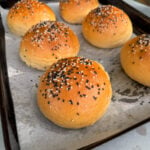Leftover Roast Potato Burger Buns
Here's how to turn leftover roast potatoes into a batch of homemade burger buns! These are soft & fluffy and perfect for a roast beef sandwich.
Servings: 6 Buns
Equipment
- Stand Mixer
- Digital Food Probe
- Saucepan
- Potato Ricer
- Baking Tray
Ingredients
Roast Potato Mash
- 150 g Leftover Roast Potatoes (See Notes)
- 150 g Whole Milk
Dough
- 350 g Strong White Bread Flour
- 80 g Whole Milk
- 50 g Water
- 6 g Dried Active Yeast
- 7 g Fine Sea Salt
- 15 g Caster Sugar
- 1 tsp Skimmed Milk Powder
- 1 Large Egg (50g Out Of The Shell)
- 35 g Unsalted Butter (Room Temperature)
Egg Wash
- 1 Egg
- 1 tsp Cold Water
To Finish
- 2 tsp Sesame Seeds (White, Black Or A Mix Of Both)
- 25 g Melted Unsalted Butter
Instructions
Roast Potato Mash
- Chop the roast potatoes into 2cm pieces then add into a small saucepan with the milk. Cover the pan with a lid then set over a low heat.
- Cook the potatoes, stirring occasionally until the liquid has reduced completely & the potatoes are soft. This will take 5-10 minutes.
- Once cooked, use a potato ricer to mash the potatoes then weigh out 200 grams of mash & leave to cool to room temperature.This should be all of the potatoes! It's best to weigh the mash out though to make the dough accurately.
Dough
- Place the milk & water into a jug & warm in the microwave to 38°c/100°f (alternatively you could heat this up in a saucepan then transfer to a jug), then whisk in the yeast & leave to go bubbly. This will take 5-10 minutes.
- Next, add the flour, mashed potato, salt, sugar, milk powder & egg into the bowl of a stand mixer. Give the activated yeast another whisk then add into the flour.
- Using the dough hook, knead the dough on a medium speed until smooth & starting to come away from the sides of the bowl. This will take around 5 minutes.
- With the mixer still going, add in the soft butter a small amount at a time, incorporating each piece fully before adding more. Once all the butter has been incorporated, keep mixing until the dough passes the window pane test. This will take another 5-10 minutes.To perform the windowpane test, stretch a small amount of dough between your fingers. If the dough stretches thin enough to see through, it's ready. If it doesn't, it needs more mixing.
- Once the dough is ready, cover the bowl with clingfilm (or a tea towel) then let it prove at room temperature until it has doubled in size. This will take 45 minutes - 1 hour.
Shaping
- Once risen, knock the dough back then transfer it to a lightly floured surface. Then use a bench scraper to divide the dough into 6 equal pieces. Each should weigh around 130 grams.
- To shape, take a piece of dough & bring the edges into the middle. Flip the dough over & use cupped hands to shape into a tight ball. Dragging the seam on the work surface helps increase surface tension.
- Transfer the shaped bun to a lined baking tray then repeat the shaping process with the remaining pieces of dough. Make sure to place the buns spaced apart on the tray, so that they have room to rise.
- Once shaped, lightly press each bun down with your fingers then cover the tray with a roasting tin (flipped upside down) or loosely with oiled clingfilm. Leave to double in size at room temperature. This will take 30 – 45 minutes.Pressing the buns down slightly helps them rise more evenly. If you don't I find that the buns can peak on top once baked.
- In the meantime, preheat an oven to 180°c/160°c fan (356°f/320°f).
Baking
- Once the buns have risen, make the egg wash by adding the egg & water into a small bowl then whisk together. Brush each bun with a generous amount of the egg wash then top with a sprinkle of sesame seeds.
- Bake the buns in the preheated oven for 20-25 minutes, until they have risen & are a deep, golden brown.
- As soon as the buns come out of the oven, brush each one with a generous amount of melted butter then leave to cool completely on the tray.Melt the butter whilst the buns are baking, so that it's still warm when you brush it on!
Notes
1. Cooking In An Aga - Cook the mashed roast potatoes on the simmering plate and bake the buns in the baking oven, on the bottom set of runners.
2. Roast Potatoes - I used leftover goose fat roast potatoes but feel free to use a different recipe if you'd prefer. Make sure to use leftover potatoes that have been fully roasted & chilled.
3. Flour - For this bun recipe, you'll need to use a strong white bread flour with a protein content between 12-14%. I use a Canadian white bread flour from Shipton Mill.
4. Yeast - I like to use dried active yeast for most breads but instant/fast action yeast will work as well. You won't need to activate instant yeast in the liquid, it can be added directly into the flour. Keep in mind that instant yeast will make your dough rise slightly quicker than dried active yeast.
5. Storage - Make sure to store the buns in an airtight container, to keep them fresh! Stored at room temperature, they'll last for 2-3 days or they can be stored in the fridge & you'll get a couple of days extra shelf life.
